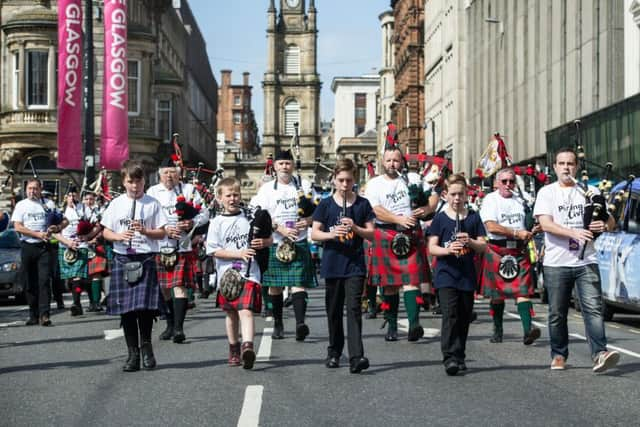Festival review: Piping Live! Glasgow


Piping Live! | Various venues, Glasgow | Rating ****
As Monday saw Glasgow city centre resonating to unbridled drone power, in the canopied Street Café outside the National Piping Centre, Duo Calanca-Lipparini, from Bologna, featured Franco Calanca’s piva Emiliana, a two-droned instrument resembling the antique bagpipe found on cathedral carvings across Europe.
With Mario Lipparini accompanying on Celtic harp and guitar, there was a cheerful timelessness in their spirited tarantellas and medieval saltarellos. They also played a suite by Corelli, a composer who wasn’t averse to pinching pipe tunes for his more pastoral compositions.
Advertisement
Hide AdAdvertisement
Hide AdFor sheer antiquity, however, you couldn’t beat the aulos, simply two reed pipes blown simultaneously through circular breathing by Callum Armstrong, his bagless progenitor of the bagpipe modelled on a two-and-a-half-thousand-year-old Greek aulos in the Louvre.
In contrast, Armstrong gave a frequently astonishing performance on his state-of-the art, double-chantered small pipes, at times sounding like two players as he fingered polyphonic harmonies, counter-melodies and blistering staccato runs.
Later on Monday it was back to more familiar territory as two players associated with the festival since its beginnings, Ross Ainslie and Ali Hutton, gave a taste of their new duo album, Symbiosis, with a take-no-prisoners blast on twin Highland pipes, accompanied by guitarist Steve Byrnes, the hot pursuit of Hutton’s Hounds on the Heath tempered by some liquid-toned whistle playing.
Sounding elsewhere were some of some of the 230-plus bands converging on the city for the World Pipe Band Championships, the finals of which are played out on Glasgow Green today. Below Donald Dewar’s statue at the top of Buchanan Street, the Portland Metro band from Oregon was briskly quelling any nearby buskers but failing to shift the seagull from the first First Minister’s head.
Midday on an ineffably dreich Wednesday and, back at the Street Café, there was rare outing for the sophisticated little “baroque bagpipe”, the 18th-century French musette de cour, played by the Belgian Bourdon Collectief, their two musettes accompanied by fiddle, cello and harpsichord. The encroaching damp, barbeque smoke, chatter and traffic noise maybe wasn’t the ideal environment, but they brought humour and elegant flourishes to the pastoral music of composers such as Boismortier and Courette.
From the George Square tent came the distinctive chirping of Slovakian bagpipes – as well as some lusty singing – from four players from the Guild of Slovakian Bagpipers, their drones and chanters bell-ended, the stocks carved like sheep’s heads. They also coaxed intriguing sounds from their impressively tall fujara overtone flutes.
Even as these central European strains died away, outside, the Toronto Police Pipe Band was sounding defiantly through the smirr, the Canadians playing music by the peerless piper-composer Gordon Duncan, whose Perthshire genius now resonates throughout the world.
Advertisement
Hide AdAdvertisement
Hide AdPacing the boards in the Piping Centre auditorium, meanwhile, was one of competition piping world’s foremost players, William McCallum, a record eight-times winner of the prestigious Glenfiddich competition. Though battling a cough, he gave a characteristically authoritative performance including the slow, stately calling of Donald Macleod’s piobaireachd McMurrich’s Salute.
In the same auditorium that night, the Lowland & Border Pipers Society hosted a concert demonstrating vividly how Scotland’s bellows pipes have consolidated their revival after near-extinction. Once again, there was Callum Armstrong, combining his own distinctive compositions with a tune, Wee Winking Thing, from the 18th century Dixon Manuscript.
Dixon, too, was the source of one of Brighde Chaimbeul’s pieces, Hacky Honey, which spun deftly into ever-intensifying variations under the fingers of the Radio 2 Young Folk Award-winner.
There was fire a-plenty in the playing of Angus MacKenzie, accompanied by guitarist Ross Martin (both from the band Daimh), then Angus Nicolson, accompanied on fiddle by Ewan Henderson. Both deployed bellows-blown Border or reel pipes with panache, but in a distinctly Highland (or in Mackenzie’s case Highland-Cape Breton) mould. Both duos combined for an exuberant closing set which fairly gave the well-known reel Mrs MacPherson of Inveran the time of her life.
And amid all this joyful reed power, nary a word about that other, non-drone-fixated festival less than 50 miles along the M8, but which might as well be in a galaxy far, far away.
Piping Live continues today and tomorrow, see www.pipinglive.co.uk